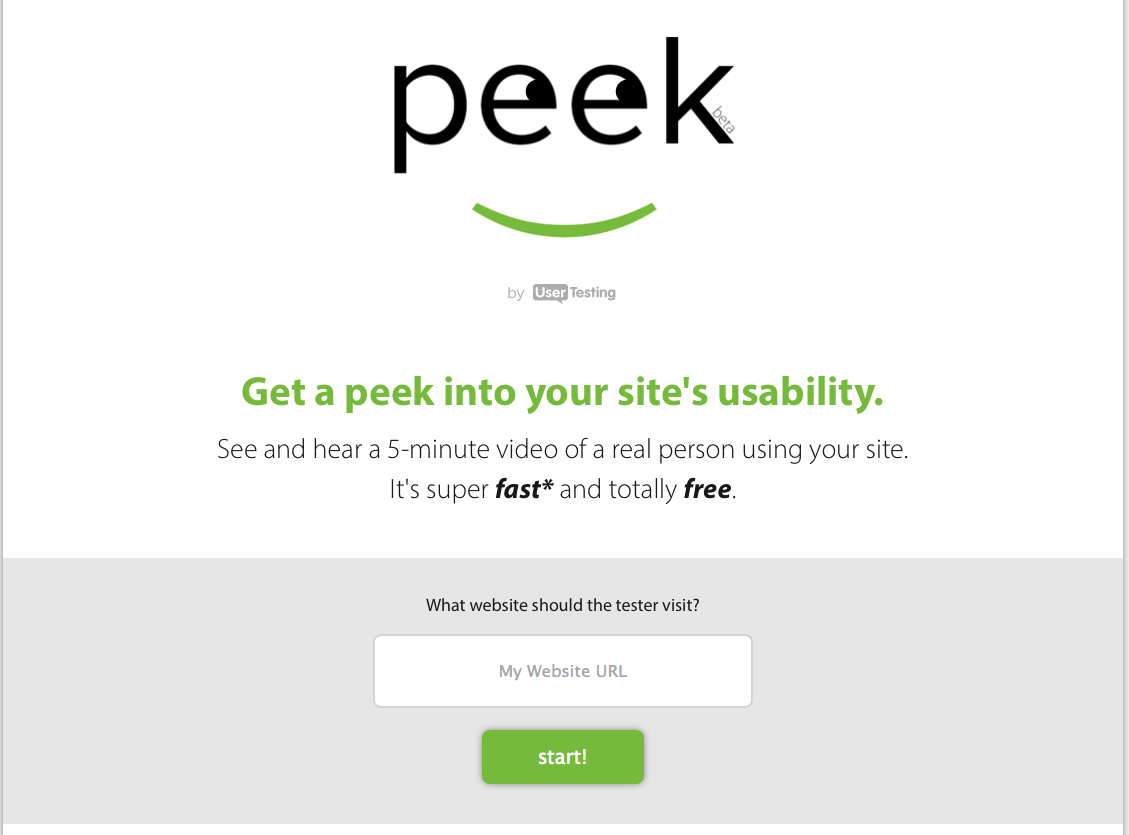We've hosted several free website critique webinars on PhotoLovecat.com, based on the best practices that we've identified in our industry and across websites in general. Since we don't have the time to test everyone's websites, here are some resources to help you get feedback on your own website right now!
UserTesting - Peek
http://peek.usertesting.com
UserTesting offers a free "peek" of their services in a 5 minute recorded video of a user clicking around your specified website and sharing what they love and don't love about how your site navigates as well as the information available on it. This is a great way to see how an objective general user interacts with your navigation menus, contact form, and online content so that you can see what fixes you might be able to address in order to improve your website for visitors.
HubSpot - Marketing Grader
https://marketing.grader.com
HubSpot is one of my favorite free services for analyzing your site's inbound marketing strategies with SEO, Lead Generation links, Social Media reach, and other online markers of presence and accessibility. The software is fully automated, so it's less high-touch, but it approaches your website from a similar perspective as a content web crawler like Google would. This is a great way to see what social media and marketing strategies you aren't currently implementing that you can improve upon.
Pingdom - Speed Test
http://tools.pingdom.com
Pingdom focuses on improving website speeds by identifying slow loading materials on a page as well as what loads first and last. One of the factors in how your website ranks in search results is how fast your content can make it to the search engines, so running a speed test can help you identify the images or code that need to be cleaned up for faster loading. Pingdom also gives you a sample of how your website stacks up against other sites that are being compared so that you know where you stand in loading times.
Try each test now and see what you can work on! Have you seen any other awesome website tests people should run their website through? Share in the comments!
 Anne Ruthmann is an editorial & event photographer in New York City. She spent 10 years practicing marketing & management in corporate and non-profit businesses before pursuing her passion for photography in 2004 as an independent small business. She loves helping others find creative and smart solutions to business problems. Stay in touch on Twitter or Facebook.
Anne Ruthmann is an editorial & event photographer in New York City. She spent 10 years practicing marketing & management in corporate and non-profit businesses before pursuing her passion for photography in 2004 as an independent small business. She loves helping others find creative and smart solutions to business problems. Stay in touch on Twitter or Facebook.
UserTesting - Peek
http://peek.usertesting.com
UserTesting offers a free "peek" of their services in a 5 minute recorded video of a user clicking around your specified website and sharing what they love and don't love about how your site navigates as well as the information available on it. This is a great way to see how an objective general user interacts with your navigation menus, contact form, and online content so that you can see what fixes you might be able to address in order to improve your website for visitors.
HubSpot - Marketing Grader
https://marketing.grader.com
HubSpot is one of my favorite free services for analyzing your site's inbound marketing strategies with SEO, Lead Generation links, Social Media reach, and other online markers of presence and accessibility. The software is fully automated, so it's less high-touch, but it approaches your website from a similar perspective as a content web crawler like Google would. This is a great way to see what social media and marketing strategies you aren't currently implementing that you can improve upon.
Pingdom - Speed Test
http://tools.pingdom.com
Pingdom focuses on improving website speeds by identifying slow loading materials on a page as well as what loads first and last. One of the factors in how your website ranks in search results is how fast your content can make it to the search engines, so running a speed test can help you identify the images or code that need to be cleaned up for faster loading. Pingdom also gives you a sample of how your website stacks up against other sites that are being compared so that you know where you stand in loading times.
Try each test now and see what you can work on! Have you seen any other awesome website tests people should run their website through? Share in the comments!


